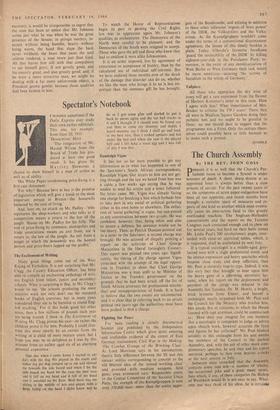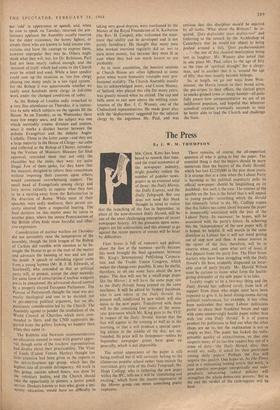The Church Assembly
By THE REV. JOHN GOSS
ER-MPS it is as well that the Church's Par- r liament (soon to become a Synod) is under sentence of death. A short, sharp demise at an appointed hour is always better than a slow process of suicide. For the past twenty years or so, the symptoms of acute paper-indigestion have been all too apparent, and recent months have brought a veritable spate of measures and re- ports of one kind or another which must eventu- ally cause an obstruction fatal to this grossly overloaded machine. The Anglican-Methodist conversations and the report on the Toronto Congress each contained enough cud to chew on for several years, but hard on their heels comes Mr. Leslie Paul's 300 revolutionary pages, inter- larded with close-set statistical, tables, which, it is requested, shall be assimilated by next July.
If a typical sociologist is a middle-aged, grey- haired man with a slight professorial stoop, and the intense expression and heavy spectacles which bespeak close study and deep reflection, then Mr. Paul is certainly true to type. Indeed, it was this• very fact that brought to bear upon him the heavy guns of a charm* university lec- turer, when his report on the deployment and payment of the clergy was debated in the Assembly last Tuesday. Dr. M. Hewitt, a bright, brisk brunette from Exeter, and herself a sociologist, nearly torpedoed both Mr. Paul and the Council for the Ministry who briefed him. Her steady fire of criticism, to which the House listened with rapt attention, could be summarised as: 'How dare you imagine for one moment that a sociologist is competent to judge or advise upon church work, however accurate the facts and figures he has collected?' Mr. Paul blinked amiably at this onslaught from his seat amidst the members of the Council in the packed Assembly, and, with the aid of other more com- plimentary speeches, he and they and his report survived, perhaps to face even heavier a•tacks at the next session in July.
Someone once remarked that the Assembly contains some odd fish--a number of whales, the occasional pike and a great many sprats. Into which, if any, of these categories the Bishop of Woolwich would fit is not easy to say. What- ever one may think of his ideas. he is certainly
not 'odd' in appearance or speech, and, when he rose to speak on Tuesday, received the pre- liminary applause the Assembly usually reserves for the elder statesman, the bonny fighter,• or simply those who are known to hold sincere Con- victions and have the courage to express them, however unpopular they may be. Others might think what they will, but, for Dr. Robinson, Paul had not been nearly radical enough, and the 'moment of truth' which had come to the Church must be seized and used. While a later speaker could sum up the situation as 'too few clergy chasing too many souls in a too rigid system,' for the Bishop it was questionable whether we really need hundreds more clergy in full-time work under the changed conditions of today.
As the Bishop of London sadly remarked to a very thin attendance on Thursday, it is instruc- tive to note which subjects on the agenda fill the House. As on Tuesday, so on Wednesday there were few empty seats, and the subject was one which inevitably creates division and tension, since it marks a distinct barrier between the definite Evangelical and the definite Anglo- Catholic. Those in the latter camp—and they are a large majority in the House of Clergy—sat calm and collected as the Bishop of Chester, introduc- ing the Vesture of Ministers Measure for final approval, reminded them that not only the chasubles but the stoles they wear are quite illegal. Few of them spoke, for they knew that the measure, designed to relieve their consciences without imposing their customs upon others, would command overwhelming support. The small band of Evangelicals among clergy and laity strove valiantly to oppose what they feel to be a turning-away from the Reformation in the direction of Rome. While most of their speeches were sadly mediocre, their patent sin- cerity ensured them a respectful hearing. The final decision on this matter must be taken in another place, where the innate Protestantism of the British often finds more forceful and effec- tive expression.
Consideration of nuclear warfare on Thursday did not noticeably raise the temperature of the assembly, though the Irish brogue of the Bishop of Carlisle did tremble with emotion as he be- sought the House to go to the root of the matter and advocate the banning of war and not just the bomb. A speech of refreshing vigour came from a young layman (Mr. R. J. H. Edwards, of Southwell), who reminded us that no political party will, at present, accept the clear necessity for some form of conscription if nuclear weapons are to be abandoned. He advocated shared control by a properly elected European Parliament. The Provost of Portsmouth thought the issue was pri- marily theological and one to be decided, not in pre-election political argument, but on dis- PassiOnate consideration led by the Church. The Assembly agreed to ponder the resolutions of the World Council of Churches which were com- mended to them, and the CND supporters de- parted from the gallery looking no happier than when they came in.
The Robbins. and Newsom recommendations on education seemed to meet with general appro- val, though some of the teachers' representatives had doubts about their practicability. The Vicar of Leeds (Canon Fenton Morley) thought too little attention had been given in the reports to the ten-to-fourteen age group, which has the highest rate of juvenile delinquency. All work in this group, outside school hours, was done by the voluntary bodies, and the Church should take the opportunity to pioneer a junior youth service. Dockers known to him who, given a uni- t versity education, would have no difficulty in
taking very good degrees, were mentioned by the Master of the Royal Foundation of St. Katharine (the Rev. H. Cooper), who welcomed the state- ment that ability can be developed and is not purely hereditary. He thought that many Tnen who worked overtime regularly did so, not to earn more money, but because they were ill at ease when they had too much leisure to use profitably.
As in most assemblies, the heaviest sessions at Church House are often lightened at some point when warm humanity triumphs over pro- fessional stolidity. The Church Assembly usually has its acknowledged jester, and Canon Hussey, of Salford, who played this role for many years, was greatly missed when he retired. The cap and bells seem to rest now above the smiling coun- tenance of the Rev. J. C. Wansey, one of the Chelmsford representatives. He made great play with the 'deployments' suggested for the inferior clergy by the ingenious Mr. Paul, and was
anxious that this discipline should be enjoyed by all ranks. 'What about the Bishops?' he in- quired. 'Quis deployabit ipsos deployeres?' and (referring to the remark by the Archbishop of Canterbury that he would not object to being pushed around a bit), 'Quis pusharoundabit . . .'—the rest of this classical masterpiece being lost in laughter. Mr. Wansey also noted that in one place Mr. Paul refers to the age of fifty as the time of 'spiritual drought' for a clergy- man, and in another that it is 'around the age of fifty' that men usually become bishops.
So, at length, we go our ways from West- minster, the Harris tweeds to their broad acres, the pin-stripes to their offices, the clerical greys to smoke-grimed town or sleepy hamlet—all pain- fully aware how unrepresentative we are of an indifferent populace, and hopeful that whatever synodical creation eventually succeeds us may be better able to lead the Church and challenge the State.



































 Previous page
Previous page